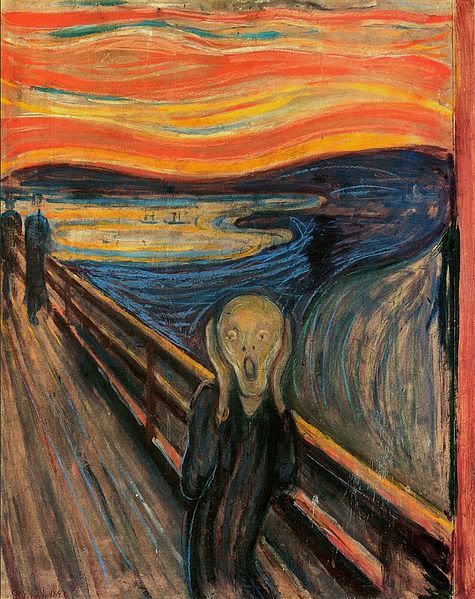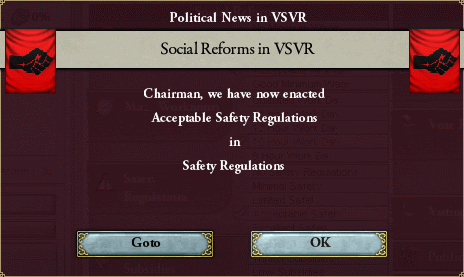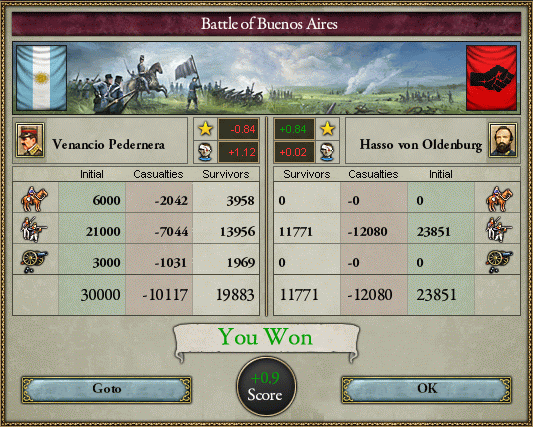The VSVR 1895-1900 (Part 1)
It is a point forgotten by many that at the tail end of the 19th century the VSVR enjoyed and incredible cultural flourishing. First a wave of impressionist painters started to create incredible works of art from major artistic clusters on the Rhine then, towards the end of the century, expressionism started to become the dominant art form as Munich’s Schwabing Circles grew in fame the world over. It truly was a great period for culture in the Republic.
Yet politically it was filled with just as much turmoil as the previous half century.
The agreement that brought the Marxist Bloc together promised the Luxemburgists economic control and the Marxist-Leninists a free hand in foreign affairs. Beyond that the coalition had few guidelines. However one of its first moves was to put in place a series of safety regulations that were met with joy from both the country and the city.
However this honeymoon period was not to last more than a few months. Tensions within the coalition were ignited when Lenin proposed before the Assembly the institution of an 8 hour working day. The Marxist-Leninists had been the only faction to support this during the electoral campaign due to its controversial nature. In urban areas and 8 hour day was the single most demanded reform from government yet in rural areas many peasants and threatened violence if the day was further shortened by law (many feared harvests would become impossible if the day was shortened by another 2 hours). The Luxemburgists might have caved under mounting pressure from 8 hour day demonstrators, from Spark and from attacks on the floor of the Assembly and the Central Committee if it hadn’t been for a warning from Sorel. Sorel promised ‘bloody insurrection’ and ‘a new revolution’ if this blatantly anti-peasant law was put into place. In the end the Luxemburgists voted down Lenin’s 8 hour day resolution in the Central Committee – siding with Anarchists and Revolutionaries to defeat their own coalition partners.
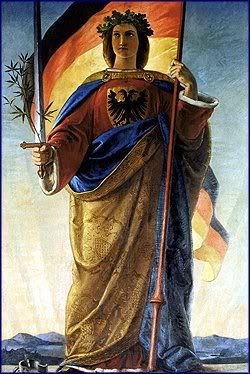
Luckily for the coalition they would be galvanised through the summer of 1895 by the emergence of a new threat – the True Germans. The True Germans were a body founded and led by Nicholas Bismarck - the son of the ill fated Prussian Chancellor. Whilst in his teens and early 20s Bismarck had witnessed the VSVR sweep across first Prussia (where his father was killed) and then Bavaria (where he studied at University). After the revolution had come to Bavaria Bismarck decided to join with the new socialist state rather than flee it as many aristocrats had. He renounced all his titles and joined the Red Army as a common soldier. After around a decade of service, during which time he was promoted to the officer core, he was wounded during the Civil War whilst fighting the Anarchists and was discharged from the military. After this he moved into the realm of politics. At first he supported the Marxist-Leninists (who he had fought for in the Civil War) but became disenchanted and left them towards the end of the 1880s. He briefly espoused the Revolutionaries but could not abide by their peasant focussed world view.
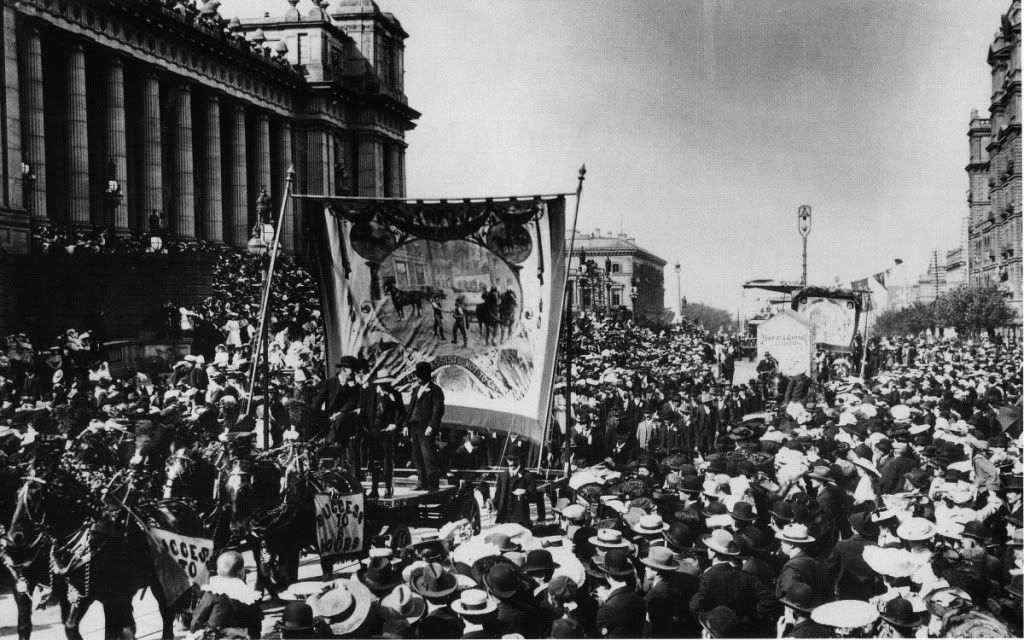
Around the mid 1890s the True German movement really started to come together. The movement clung to the old world German values and nationalism that had for almost half a century been repressed by the state. They supported freedom of religion, German family values (taking advantage of the misogyny inherent amongst much of the German population to attack Rosa Luxemburg), not just German nationalism but nationalism of Poles, Walloons and Flemings too. The True Germans also used inflammatory tactics to accuse various parts of the People’s Party of being ‘bourgeois harbourers’ and ‘capitalist sympathisers’. Prior to 1895 the group had been dismissed as a bunch of radicals, counterrevolutionaries and madcap extremists. However on May Day 1895 Bismarck had gathered some 50,000 workers to march through the city of Berlin bearing the banners of the True Germans. This statement of force surprised both the True German leadership and the People’s Party in its strength and during the summer Bismarck started to make moves into becoming a force in VSVR politics. In late May he joined the People’s Party and instructed his supporters to do likewise before going on a major recruitment campaign to whip up support from all parts of the VSVR.
This new threat to the Marxists pushed Lenin and Luxemburg closer together – forcing unity between them as they fought against a common foe. Around this time major outbreaks of street violence started to flare up for the first time since the Civil War as Marxist and True German thugs fought each other.
In December event in the Republic of Argentina opened up the first real opportunity to Lenin to flex his muscles in foreign affairs. On December 16th the People’s Liberation Front of Argentina (a Marxist-Leninist revolutionary organisation) rose up against their bourgeois masters mustering an impressive army. On December 19th, with the blessing of Cologne, the People’s Republic of Chile invaded Argentina and the following day the VSVR announced its support for the efforts to overthrow the bourgeoisie in Argentina.
Rosa Luxemburg was in favour of sending aid and funding to both Chile and PLFA but stopped short of a military intervention. Lenin on the other hand demanded a large-scale invasion of La Plata in order to force the Argentines to split their forces between a VSVR invasion, the PLFA which was strongest in Patagonia and the North-East and the Chileans who invaded from the West.
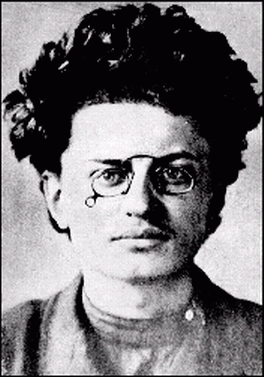
Lenin turned to a 25 year old Ukrainian Jew who went by the name of Leon Trotsky to lead the expedition to the River Plate. Trotsky had arrived in the VSVR at the age of 19 after being driven from Russia by the Ochrana. He quickly joined both the People’s Party and the Red Army – excelling in both. Indeed his impressive oratory abilities had seen him elected to represent the Warsaw Soviet (one of the largest in the Republic) at just 21. However it was the Red Army where he found his true calling. Deployed to Sweden in 1892 (as a punishment for angering his superiors) yet given a chance to test himself against the Nordic counterrevolutionaries he proved his not inconsiderable abilities and quickly won promotion after promotion and the attention of one Vladimir Lenin. When he returned to the VSVR in 1894 Lenin ensured that he become a Major General in the Red Army. The following year he was promoted again and in December he was given his first opportunity to truly prove himself to his Comrades as he was deployed to Argentina.
After arriving in Argentina the 30,000 man expedition split up with the majority of troops heading South into the Pampas whilst Trotsky remained in Buenos Aires with some 9,000 men.
However the Argentines would soon punish his decision to split his army as 30,000 fresh and well trained soldiers arrived in the East in late February. They struck at Trotsky’s paltry force at Buenos Aires, expecting the Red Army to break. Yet Trotsky held on for two weeks with just 6,000 men until a further 6,000 men in the form of a cavalry unit could arrive. Yet still the Argentines had a clear upper hand. It wasn’t until over a month after the battle began that 12,000 infantrymen arrived to finally end the affair – sending the Argentine army into flight. The victory greatly improved Trotsky’s prestige back in the VSVR, this would soon become very important.
Back in the VSVR in late 1895 and early 1896, with incredible speed, a new unemployment crisis emerged – this time in Wallonia. The spread of electrical lighting and other new technologies in the 1890s encouraged a huge wave of rural-urban migration as the cities became more attractive to migrants and collective farms required less labour. On top of this the militancy of the Revolutionaries in the countryside was seen as frightening by many. Nowhere was the migration more pronounced than in the second oldest part of the Republic. In just one month 80,000 new people arrived to find no work. The problem would peak in April with unemployment in Wallonia alone at 150,000. Elsewhere many of the new industrial cities in Africa were suffering growing pains as they failed to provide enough work (there was an average unemployment rate of around 5% in the African industrial cities). Meanwhile, whilst few areas suffered as badly as Wallonia the city of Krakow experienced a brief outbreak of large scale unemployment as factories failed to come on line at a fast enough pace.
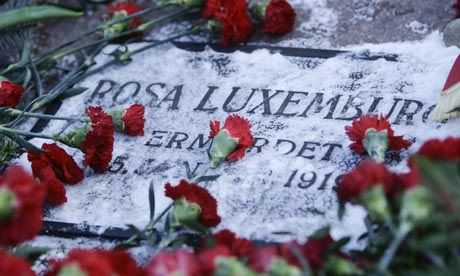
May 1st 1896 was one of those days in history that shook the entire world. For much of its history violence had been a major tool used in VSVR politics but never before had such a target been claimed. On May Day 1896 several high ranking VSVR politicians were delivering addresses to assembled crowds in Cologne – as was traditional during the celebrations. However as Rosa Luxemburg stepped up to make her speech to the crowd an unknown assailant burst forth from the crowd and fired six shots at the stage. Rosa Luxemburg was hit twice and died a few hours later, one lower ranking Party member was hit in the head and Vladimir Lenin was hit in the knee (he stood a few paces behind the Chairman). After the initial shock passed the crowd turned on the shooter and brutally beat him to death. When police finally clear the crowd away all that was left of the assassin was a mangled corpse with a jacket containing a small quantity of roubles (the Russian currency) and address to a hotel in Cologne. Tracking this hotel down all the police were able to discover was that the assassin had been seen the night before talking to a man in Russian. This might have normally been enough to raise the Republic into a jingoistic fury and send them to war. But the government was left in serious turmoil.

Lenin’s injury meant that he was unable to be as active as he might have been and instead he decided to barter with the Luxemburgists. On May 3rd the Marxist Bloc supported the Luxemburgist Karl Liebknecht’s elevation to the status of Chairman for the rest of the current term. In return for Lenin’s support Liebknecht underhandedly supported the breakup of the Moderate faction which had been underway for some time. Essentially Karl Kautsky was demoted from the Central Committee while 3 of the 4 members of the Assembly held by the Moderates join the Marxist-Leninist faction. Necazian was returned to the committee to replace the deceased whilst Zetkin return to replace the defeated.
With Liebknecht now in charge of the Republic he officially sent an ultimatum to the Tsarist court in St Petersburg. He demanded the right of VSVR investigators to enter Russia and find the culprit of the murder of Rosa Luxemburg. The new Tsar, one Nicholas II, saw this as an intolerable insult. On May 5th the Tsarist Army invaded Finland. Finland was a member of the Comintern but its Anarchist government and support for Enewald had long strained relations with Cologne. However in the current atmosphere any politicking in the Comintern was put aside and the Red Army started to pour across the border into Russia.
Trotksy was recalled from Argentina to take command of an army with the objective of capturing Minsk whilst Denmark was the only other Comintern member the VSVR called to war (the CSR’s army was too weak to be of use whilst the Swedes were struggling to deal with counterrevolutionaries).
In Finland the now aging Comrade Enewald was tasked with leading the tiny Republic's defense against the mighty Russian Steamroller that was the Tsarist Army.
The prospect of a revolutionary war to avenge their fallen leader seemed to bring the entire Republic together. The Revolutionaries, True Germans and Marxists all supported the conflict vigorously. Indeed there were even Democrat (notably Martov) and Anarchist supporters, although the leaderships of those faction refused to advocate a largescale conflict with a nation that had an alliance with Britain that might be sprung at any moment.
). Though I guess the M-L's that I often support would suffer from such a system...






